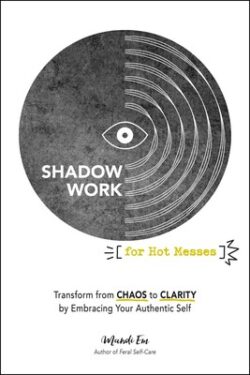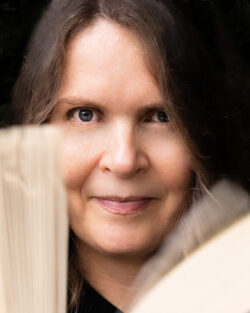No nicer witch than you
Shadow Work for Hot Messes: Transform from Chaos to Clarity by Embracing Your Authentic Self
by Mandi Em
Toronto: Simon & Schuster (Adams Media), 2024
$24.99 / 9781507222997
Reviewed by Petra Chambers
*

This is the book a cool aunt gifts to all her late-teen/adult niblings for winter solstice. She definitely also picks up a copy for herself, and one for their bombastic uncle, too.
Not just a workbook, Shadow Work for Hot Messes: Transform from Chaos to Clarity by Embracing Your Authentic Self by Mandi Em also contains all the information and encouragement anyone needs to begin to understand their shadow and to embark on the tricky task of integrating it. Her previous book is Witchcraft Therapy (2021).
I completed most of Em’s 50+ exercises and, despite having done shadow work in the past, uncovered a bunch of new insights that made this book very worthwhile. After all, no one gets their shadow thoroughly sorted the first (or third) time, and we’ve all been stashing unwanted stuff in our psychological basements since we were very young. This workbook is a compassionate, real-talk, step-by-step guide that prepares us to enter that weird basement and safely do an inventory of what’s lurking there. Spring cleaning, for the psyche.
Shadow Work for Hot Messes is divided into three sections: 1. Perception: Seeing the Unseen; 2. Investigation: Getting Cozy with your Shadow; and 3. Integration and Synthesis: Vibing with your Whole Self. Each of the 30 chapters addresses a different aspect of shadow work.
Em has a gift for teaching complex concepts. She walks us gently but inexorably through the process, so that when we reach the advanced topics explored in later chapters, they seem comprehensible. Like common sense. Which is remarkable, because Carl Jung believed that these “offer the most obstinate resistance to moral control and prove almost impossible to influence.”1 Em clearly understands the Jungian conception of the shadow, both in theory and in practice, and she demonstrates that this work is entirely possible.
Throughout, she emphasizes that shadow behaviours (all the stuff we’re not proud of) are just misguided attempts to get our needs met. If you’re feeling stuck in patterns that seem out of your control—negative self talk, recurring dysfunctional patterns, and/or chronic bad vibes—shadow work can really help.
Given that Em’s bio tags her as a ‘chaotic wellness witch,’ I expected this book to be more witchy. There are no incantations, just the insight of a smart, irreverent human who has obviously done the work herself.
Peppered with exclamation points and F-bombs, Em’s writing style is personable and brash. If you get triggered by cussing or excessive exclamation marks you should probably definitely buy this book and use it to work through whatever deeper issues lie beneath those strong emotional reactions. The things we have a strong negative response to are often directly connected to the stuff that’s skulking in our shadow. Which is why shadow work is complicated, and sometimes counterintuitive.

Em understands these nuances. For example, she explains that “many of us have an addiction to the helplessness and self-confirming bullshit that comes with emotions such as guilt, shame, and fear.” A revelation that can transform lives. In another example, she offers an opportunity to admit (to ourselves, privately) if we’ve been dismissive, inconsiderate, controlling, guarded, distrustful, attention seeking, jealous, clingy, helpless, passive-aggressive, angry, or scorekeeping in relationships. If we’re honest, chances are the answers are yes yes yes yes yes yes yes yes occasionally yes yes and yes.
It’s work, for sure, but the payoff is worth it. Whether you have an aspirational motivation (which Em refers to as “a desire to get back to authenticity and true happiness – a sacred quest to find your ‘sparkle’”) or you desperately need to do damage control (“humans are capable of a laundry list of fuckery where the shadow is involved; when we ignore or deny those qualities within us on an individual level, they can leak out, leading us to act in strange and terrible ways”), Em compassionately walks you through the process of getting your shadow sorted.
She’s like the friend who says, “it’s okay: we all act a little shitty,” when you confess your most embarrassing secrets. Those secrets are the origin of the shadow after all: the “embarrassing icks within ourselves… all the things we see in others but struggle to face within ourselves.”
She suggests that people who struggle with creativity, confidence, or with feeling optimism and joy, can (re)claim their quirky and authentic personality through shadow integration. That’s a revolutionary promise. If everyone did shadow work, what would be possible? What would humanity be capable of?
This book focuses on the individual, but Em also touches on the collective. She writes that “the collective shadow bleeds into your worldview and life experience, and you can see it reflected in some of the worst parts of humanity. Xenophobia, war, terror – all these tendencies not only lie within the most hidden corners of the individual psyche, but in the bleak corners of the psyche of our species.” By doing our own shadow work, we contribute to the healing of the collective. What a brilliant antidote to feelings of helplessness. I suspect that’s the real reason the cool aunt picks up this book for all her adult-format niblings: not just to support them in becoming the best peeps they can be, but to help them feel like they have some agency when the world feels like a shitshow.
This workbook is meant to be a catalyst. Em recommends seeking professional help whenever necessary and possible but acknowledges that counselling is expensive. The $24.99 sticker price for this book buys a big dose of therapeutic value for people who are willing to DIY.
Still unconvinced? Let’s close with a quick multiple-choice quiz:
Question: What are we here for?
- To survive long enough to reproduce.
- To make a crap-ton of money and drive places.
- To reach our fullest potential through ongoing personal development.
- To judge, gossip, and feel shame while grumpily waiting for someone to save us from ourselves.
(Answer: no matter which letter you picked, this workbook will help you.)
[Editor’s Note: Linda Rogers reviewed Mandi Em’s Witchcraft The
*

Petra Chambers (she/her) lives in the traditional territory of the Pentlatch people. She writes creative nonfiction, poetry, fiction, and hybrid forms. Her work has been published by PRISM International, Queens Quarterly, The Fiddlehead, CV2, and Prairie Fire, among others. She is the 2024 Yosef Wosk Fellow for the Vancouver Manuscript Intensive. Her first poem was nominated for a 2025 Pushcart Prize. [Editor’s Note: Petra Chambers has recently reviewed books by Sarah Marie Wiebe and RJ McDaniel for The British Columbia Review.]
- Jung quote is from his 1959 book Aion: Researches Into the Phenomenology of the Self ↩︎
*
The British Columbia Review
Interim Editors, 2023-26: Trevor Marc Hughes (non-fiction), Brett Josef Grubisic (fiction)
Publisher: Richard Mackie
Formerly The Ormsby Review, The British Columbia Review is an on-line book review and journal service for BC writers and readers. The Advisory Board now consists of Jean Barman, Wade Davis, Robin Fisher, Barry Gough, Hugh Johnston, Kathy Mezei, Patricia Roy, and Graeme Wynn. Provincial Government Patron (since September 2018): Creative BC. Honorary Patron: Yosef Wosk. Scholarly Patron: SFU Graduate Liberal Studies. The British Columbia Review was founded in 2016 by Richard Mackie and Alan Twigg.
“Only connect.” – E.M. Forster